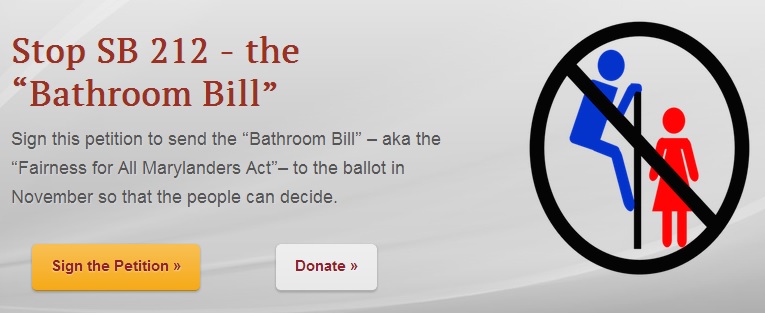
While discussing an effort to roll back a transgender non-discrimination law in Maryland, MSNBC's Ronan Farrow called out the right-wing “myth” about sexual predators entering trans-inclusive bathrooms.
On April 29, a conservative group in Maryland launched an effort calling for a referendum to repeal the recently enacted Fairness for All Marylanders Act, SB 212.
The group, MDPetitions.com, has chosen to refer to the measure as a "bathroom bill," even though the law prohibits discrimination in employment, housing, and a number of other areas not related to the use of restrooms.

It's a common conservative tactic meant to gin up fears about even basic protections for transgender people.
During the May 2 edition of MSNBC's Ronan Farrow Daily, Farrow discussed the effort to repeal SB 212, as well as the media's ongoing struggle to adequately cover the transgender community:
The fact that a major cable news outlet took the time to cover the fight over a state's transgender protections is remarkable. Aside from the transphobic panic attacks that occasionally flare up on Fox News, stories about the transgender community's fight for equal treatment don't typically get much national media coverage.
What's more remarkable, though, is Farrow's decision to use the terms “myth” and “scare tactics” when describing right-wing fears that Maryland's non-discrimination law will be exploited by sexual predators who want to sneak into women's restrooms.
He's right: the claim that non-discrimination laws will be exploited by sexual predators is demonstrably false. In state after state with non-discrimination laws already on the books, experts have found no evidence whatsoever that protections for transgender people lead to increased incidences of sexual assault in bathrooms. In reality, transgender people are disproportionately victims of violence and harassment in public restrooms.
The same has been true in Maryland counties that already prohibit discrimination against transgender people. During the debate over SB 212, for example, Montgomery County Police Chief Tom Manger explicitly debunked claims that his county's law had led to an increase in sexual assault.
Simply put, if sexual predators are already willing to break the law and carry out sexual assault, they're probably not too concerned with whether they're legally allowed to enter a women's restroom.
But Farrow didn't have to call the right-wing horror story about transgender protections a “myth.” Like many news outlets, he could have chosen to play it safe, present both sides' positions on the measure, and let viewers figure it out. That “he said, she said” approach typically leaves audiences feeling confused and unable to decide which side is telling the truth.
But the impact of protections for transgender people isn't, and shouldn't, be up for debate. The right-wing “bathroom” fear is a myth. Farrow was right to treat it as such, and other news outlets should be equally willing toaggressively debunk misinformation, especially when it stands in the way of basic civil rights.
It's not bias or activism to call a lie a lie; it's good journalism.